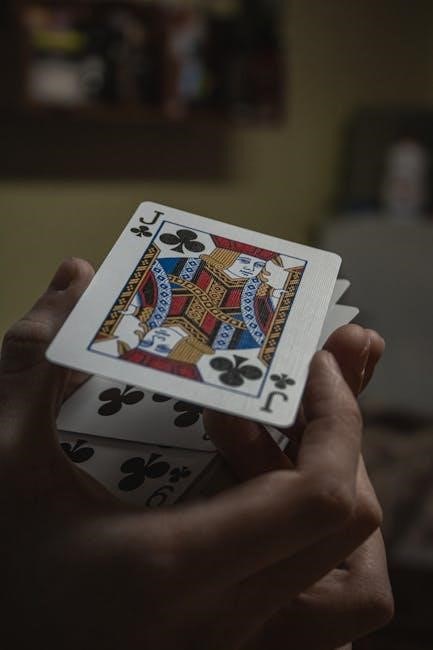Card games offer endless entertainment, combining strategy and luck․ Popular games like Blackjack and Beggar My Neighbour showcase diverse rules and objectives, appealing to players of all ages․
1․1 Overview of Popular Card Games
Popular card games vary widely, offering unique experiences․ Blackjack focuses on reaching 21, while Beggar My Neighbour emphasizes strategy and luck․ The Math Card Game tests numerical skills, and Pick and Pass involves strategic passing and collecting cards․ Each game has distinct rules, making them appealing to different preferences and skill levels, ensuring endless entertainment for players worldwide․
1․2 Importance of Understanding Rules
Understanding rules is crucial for fair play and enjoyment․ Misinterpretations can lead to disputes and hinder learning․ Clear rules ensure smooth gameplay, allowing players to focus on strategy and fun․ Whether it’s Blackjack, Beggar My Neighbour, or the Math Card Game, knowing the guidelines enhances the experience for everyone involved, making each game more engaging and enjoyable for all participants․

Setup and Dealing
Shuffling and dealing are essential steps․ Players receive an equal number of cards, and the remaining deck is placed face down․ The top card is revealed to start the discard pile․
2․1 Shuffling and Dealing Cards
Shuffling ensures randomness․ The deck is mixed thoroughly, often via riffle or overhand methods․ Cards are then dealt evenly to all players, typically face down․ The remaining cards form a draw pile, with the top card turned over to start the discard pile, setting the game’s initial state for play to begin․
2․2 Determining the Starting Player
The starting player is often chosen by drawing cards or mutual agreement․ Each player draws a card, and the highest value determines who goes first․ Ties may require redraws․ Alternatively, the youngest player or host begins, ensuring fairness and clarity before gameplay commences, setting the stage for a smooth and organized start to the game․

Gameplay Mechanics
Gameplay involves players taking turns, following specific card rules, and using strategies to outplay opponents․ Mechanics include drawing, discarding, and strategically using special cards to achieve game objectives effectively․
3․1 Basic Rules for Playing Cards
Games begin with shuffled decks, dealing equal cards to players․ The youngest player often starts, taking turns to place cards on a discard pile․ Number cards add to totals, while special cards alter gameplay․ Wild cards can represent any value, and players must follow suit unless instructed otherwise․ Adhering to these rules ensures smooth, enjoyable gameplay across various card games․
3․2 Special Cards and Their Functions
Special cards, like wild cards, reverse, or skip cards, add unique twists to gameplay․ Wild cards can represent any value, while reverse cards change play direction․ Skip cards force a player to miss a turn․ These cards enhance strategy, allowing players to disrupt opponents or gain advantages․ Their functions vary by game, adding depth and excitement to standard rules․
Scoring and Winning Conditions
Scoring and winning conditions vary by game․ Points are often earned through card values or achieving specific objectives․ The game ends when a player reaches a set score or completes a goal, determining the winner․
4․1 How Points Are Calculated
Scoring systems vary across card games; In Blackjack, points are calculated based on card values, with face cards worth 10 and Aces valued at 1 or 11․ In other games, points may be earned through numbered cards or by winning tricks․ Each game has specific rules for tallying points to determine the winner․
4․2 Ending the Game and Declaring a Winner
Games conclude when predefined conditions are met, such as reaching a target score or exhausting the deck․ The winner is often determined by the highest points or completing specific objectives․ In Blackjack, the game ends when all players have finished their hands, with the winner being the one closest to 21 without busting․ Clear criteria ensure a fair conclusion․

Strategies and Tips
Mastering card games requires strategic thinking and adapting to situations․ Use wild cards wisely, observe opponents’ moves, and plan your card plays to maximize advantages and minimize risks․
5․1 Common Tactics to Improve Your Game
Effectively plan your card plays to minimize risks and maximize advantages․ Observe opponents’ moves to anticipate their strategies․ Use reverse or skip mechanics to disrupt their flow, and save high-value cards for critical moments to turn the game in your favor․ Timing and adaptability are key to outsmarting opponents and securing victories in competitive card games․
5․2 Avoiding Mistakes
Avoiding common errors is crucial for improving your card game performance․ Poor timing, not adapting to opponents’ strategies, and neglecting card values can lead to unnecessary losses․ Stay observant, manage your cards wisely, and refrain from impulsive plays․ Learning from mistakes and maintaining focus will help you avoid costly oversights and enhance your overall gameplay effectiveness in competitive scenarios․
Popular Card Game Variations
Explore exciting variations like Blackjack, Pick and Pass, and Beggar My Neighbour․ Each offers unique rules and strategies, ensuring fresh experiences for players of all skill levels․
6․1 Blackjack Rules and Variations
Blackjack aims to beat the dealer’s hand without exceeding 21․ Face cards are worth 10, while Aces can be 1 or 11․ Popular variations include European and American Blackjack, differing in dealer rules like hole cards․ Some versions introduce side bets, enhancing gameplay depth․ These variations keep the game dynamic and engaging for players seeking new challenges․
6․2 Pick and Pass Card Game
The Pick and Pass Card Game is designed for 2-8 players aged 8 and up․ It includes 181 playing cards, 22 menu cards, 8 pawns, and a game board․ Players shuffle and deal 5 cards each, placing the rest face-down․ The game involves picking and passing cards strategically, with Wild cards adding unique twists․ The goal is to follow the rules and outmaneuver opponents to win․

Rules for Specific Card Games
Explore detailed rules for popular games like Blackjack and Beggar My Neighbour, each offering unique twists and strategies for players to master and enjoy․
7․1 Beggar My Neighbour
Beggar My Neighbour is a classic card game for 2-8 players․ The goal is to avoid being the “beggar” by collecting all the cards․ Players take turns playing cards, with certain cards forcing opponents to draw extra cards․ The game ends when one player has all the cards, making them the winner․ Strategy and luck combine in this simple yet engaging game․
7․2 Math Card Game
The Math Card Game is an educational and fun activity using a standard deck․ Players take turns adding card values, aiming not to exceed 100․ Face cards are worth 10, aces are 1, and numbered cards match their value․ The game ends when a player reaches exactly 100, making them the winner․ It’s ideal for 2-3 players, requiring basic math skills and strategic thinking․
Resources for Learning
Official rulebooks and online tutorials provide detailed guides for mastering various card games, ensuring players understand mechanics and strategies effectively․
8․1 Where to Find Official Rules
Official card game rules are available in rulebooks from game publishers or card manufacturers․ Websites like official game portals and PDF repositories offer downloadable guides․ For example, Blackjack rules are detailed on casino sites, while the Math Card Game and Beggar My Neighbour rules can be found in dedicated card game manuals or online forums․
8․2 Online Tutorials and Guides
Online tutorials and guides provide step-by-step instructions for learning card games․ Websites offer video tutorials, interactive demos, and downloadable PDFs for games like Blackjack, Beggar My Neighbour, and the Math Card Game․ These resources often include visual aids and examples, making complex rules easier to understand for beginners and experienced players alike․
Advanced Techniques
Advanced techniques involve mastering wild cards, reverse mechanics, and skip tactics to gain a strategic edge in various card games․ Players can enhance their gameplay by learning these specialized card functions․
9․1 Using Wild Cards Effectively
Wild cards can drastically alter gameplay by substituting for any card․ Players should use them strategically to complete sets or change the flow of the game․ Proper timing ensures maximum benefit, turning potential losses into victories․ Effective use of wild cards requires foresight and understanding of their impact on the overall strategy․
9․2 Reverse and Skip Mechanics
Reverse cards change the direction of play, while skip cards force the next player to draw a card and lose their turn․ These mechanics add unpredictability and strategy to games․ Players can use them to disrupt opponents or gain an advantage․ Understanding when to play reverse or skip cards is crucial for maintaining control and ensuring victory in competitive card games․
Mastering card games requires skill and practice․ From classic favorites to strategic variations, understanding rules and adapting strategies will enhance your gameplay․ Keep playing to refine your techniques and enjoy the endless fun of card gaming!
10․1 Summary of Key Points
Understanding the rules, setup, and strategies of card games is essential for enjoyable play․ From shuffling to scoring, each step requires attention․ Practice improves skill, while resources and guides enhance learning․ Advanced techniques like wild cards and reverse mechanics add depth to gameplay, ensuring endless fun and challenge for players of all levels․
10․2 Encouragement to Practice
Consistent practice refines your skills and enhances your understanding of card game rules․ Experiment with different strategies and explore various games to find your favorites․ Embrace challenges as opportunities to learn and improve․ The more you play, the more confident and enjoyable your gameplay will become․ Start practicing today and unlock the full potential of card games!